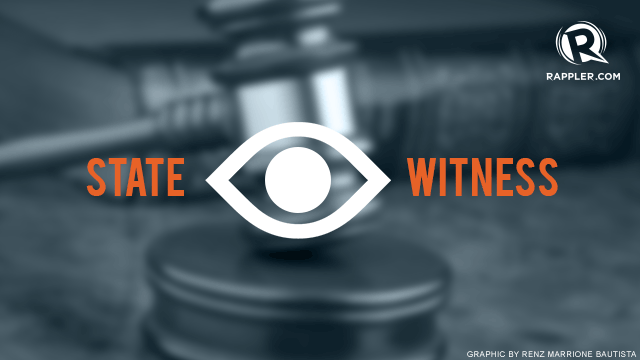Discharge of accused as state witness; court's discretion
An accused discharged from an information by the trial court pursuant to
Section 17 of Rule 119 may also be admitted to the Witness Protection Program
of the Department of Justice (DOJ) provided he complies with the requirements of Republic Act No.
6981. A participant in the commission of the crime, to be discharged to become a
state witness pursuant to Rule 119, must be one charged as an accused in the
criminal case. The discharge operates as an acquittal of the discharged
accused and shall be a bar to his future prosecution for the same offense,
unless he fails or refuses to testify against his co-accused in accordance
with his sworn statement constituting the basis for his discharge.[1] The
discharge is expressly left to the sound discretion of the trial court, which
has the exclusive responsibility to see to it that the conditions prescribed
by the rules for that purpose exist.[2]
A participant in the commission of the crime, to be discharged to become a
state witness pursuant to Rule 119, must be one charged as an accused in the
criminal case. The discharge operates as an acquittal of the discharged
accused and shall be a bar to his future prosecution for the same offense,
unless he fails or refuses to testify against his co-accused in accordance
with his sworn statement constituting the basis for his discharge.[1] The
discharge is expressly left to the sound discretion of the trial court, which
has the exclusive responsibility to see to it that the conditions prescribed
by the rules for that purpose exist.[2]
 A participant in the commission of the crime, to be discharged to become a
state witness pursuant to Rule 119, must be one charged as an accused in the
criminal case. The discharge operates as an acquittal of the discharged
accused and shall be a bar to his future prosecution for the same offense,
unless he fails or refuses to testify against his co-accused in accordance
with his sworn statement constituting the basis for his discharge.[1] The
discharge is expressly left to the sound discretion of the trial court, which
has the exclusive responsibility to see to it that the conditions prescribed
by the rules for that purpose exist.[2]
A participant in the commission of the crime, to be discharged to become a
state witness pursuant to Rule 119, must be one charged as an accused in the
criminal case. The discharge operates as an acquittal of the discharged
accused and shall be a bar to his future prosecution for the same offense,
unless he fails or refuses to testify against his co-accused in accordance
with his sworn statement constituting the basis for his discharge.[1] The
discharge is expressly left to the sound discretion of the trial court, which
has the exclusive responsibility to see to it that the conditions prescribed
by the rules for that purpose exist.[2]
While it is true that, as a general rule, the discharge or exclusion of a
co-accused from the information in order that he may be utilized as a
Prosecution witness rests upon the sound discretion of the trial court,[3]
such discretion is not absolute and may not be exercised arbitrarily, but with
due regard to the proper administration of justice.[4] Anent the requisite
that there must be an absolute necessity for the testimony of the accused
whose discharge is sought, the trial court has to rely on the suggestions of
and the information provided by the public prosecutor. The reason is obvious –
the public prosecutor should know better than the trial court, and the defense
for that matter, which of the several accused would best qualify to be
discharged in order to become a state witness. The public prosecutor is also
supposed to know the evidence in his possession and whomever he needs to
establish his case,[5] as well as the availability or non-availability of
other direct or corroborative evidence, which of the accused is the ‘most
guilty’ one, and the like.[6]
On the other hand, there is no requirement under Republic Act No. 6981 for the
Prosecution to first charge a person in court as one of the accused in order
for him to qualify for admission into the Witness Protection Program. The
admission as a state witness under Republic Act No. 6981 also operates as an
acquittal, and said witness cannot subsequently be included in the criminal
information except when he fails or refuses to testify. The immunity for the
state witness is granted, under Republic Act No. 6981, by the DOJ, not by the trial court. Should such
witness be meanwhile charged in court as an accused, the public prosecutor,
upon presentation to him of the certification of admission into the Witness
Protection Program, shall petition the trial court for the discharge of the
witness.[7] The Court shall then order the discharge and exclusion of said
accused from the information.[8]
READ MORE: FAST FACTS: On becoming a state witness.[9]
[1] Section 18, Rule 119, Rules of Court.
[2] People v. Tabayoyong, No. L-31084, May 29, 1981, 104 SCRA 724, 739.
[3] Chua v. Court of Appeals, G.R. No. 103397, August 28, 1996, 261 SCRA
112, 120; citing U.S. v. De Guzman, 30 Phil. 416 (1915) and U.S. v. Bonete,
40 Phil. 958 (1920).
[4] Ramos v. Sandiganbayan, G.R. No. 58876, November 27, 1990, 191 SCRA
671, 682; People v. De Atras, No. L-27267, May 29, 1969, 28 SCRA 389, 392.
[5] People v. Ocimar, G.R. No. 94555, August 17, 1992, 212 SCRA 646, 655.
[6] People v. Court of Appeals, No. L-62881, August 30, 1983, 124 SCRA 338,
343.
[7] Section 12, Republic Act No. 6981.
[8] Id.
[9] Reynaldo Santos Jr, 2018. FAST FACTS: On becoming a state witness. Rappler.com. https://r3.rappler.com/newsbreak/iq/49975-faq-state-witness.



